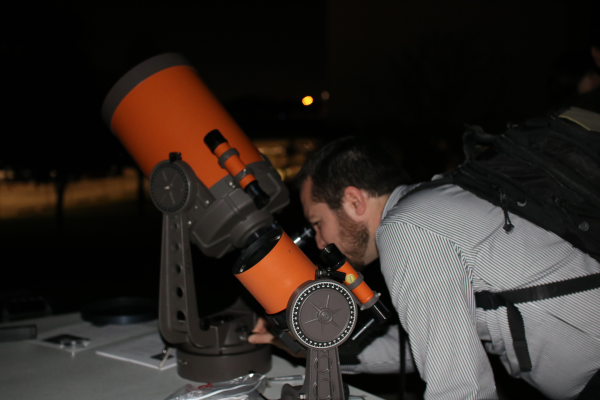By Jennifer Sanmiguel
A century ago, Albert Einstein theorized a universe in which space and time formed a fabric that could be pushed, pulled and distorted as objects moved through it.
Last month, scientists revealed the first evidence of these ripples in space-time, called gravitational waves. They heard two black holes colliding 1 billion light years away.
“When I first heard it, … the fact that we’ve measured a gravitational wave was, ‘Wow. We actually did it. Finally,’ ” astronomy and physics professor Kendra Wallis said. “The second piece is we know what caused it. So that is even more exciting.”
Scientists call the discovery a major breakthrough in physics.
Wallis conducted an informational session about gravitational waves March 3 during the college’s Science, Technology, Engineering and Math Week.

Einstein first predicted gravitational waves in 1916 in his theory of general relativity, describing them as ripples in space-time caused by large cosmic events. Instead of an empty void, he said, space is like a fabric that can be pushed or pulled as objects through it, causing distortions that create gravitational attraction.
“Einstein had predicted them about 100 years ago, and we have been looking for them ever since,” Wallis said. “It’s so exciting that general relativity can explain gravity.”
The Laser Interferometer Gravitational-Wave Observatory, a lab that attempts to capture gravitational waves with lasers, detected evidence of these waves Sept. 14 — 35 years after starting the search.
“Until now, we scientists have only seen warped space-time when it’s calm,” retired physicist Kip Thorn, who helped launch the experiment, told the New York Times. “It’s as though we had only seen the ocean’s surface on a calm day but had never seen it roiled in a storm with crashing waves.”
Scientists spent several months working to confirm the sound emitted by the lab’s antennae originated from gravitational waves.
Science major Joel Baum said he didn’t understand the importance of the news until Wallis’ presentation.
“We don’t know what we are going to be able to find from this,” he said. “Who knows? Maybe we can go out to space.”
Physics professor Yudong Mo agreed, predicting that this discovery will advance space travel.
“Maybe someday we can use that power to travel and then make it possible to travel by the speed of light,” he said. “The concept of space-time tells us that space is actually bended. … So maybe we can have a shortcut in space.”
The discovery might also lend more insight into the Big Bang, the theory that the universe was born from a single explosion of mass and energy.
“There is a time period, a fraction of a second after the Big Bang, that we don’t have a theory that explains that,” Wallis said. “And so there’s this gap. It’s a fraction of a second. It’s tiny, but it’s a gap. I think there is a really good possibility that this will spur more research.”
Gravitational waves may also contribute to the study of the evolution of galaxies, Wallis said.
“Everyone wants to know how we got to be where we are right now and then of course, what is the fate of the universe,” she said. “So general relativity is a big factor in our best guess for the future of our universe.”







